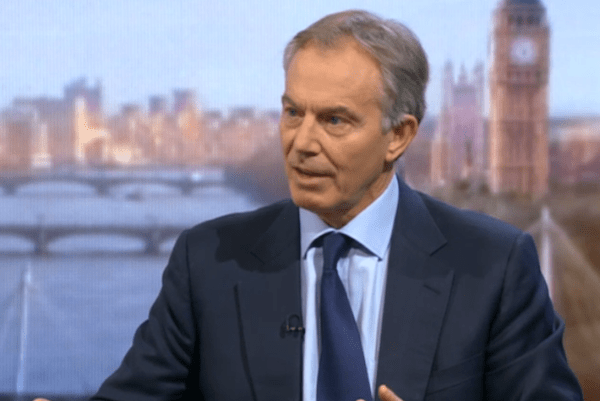Tony Blair usually grows rather awkward when asked about the current direction of the Labour party under Ed Miliband. Clearly afraid of appearing a backseat driver, the former Prime Minister tries as hard as he can to avoid delivering any kind of verdict, other than a vaguely supportive bundle of words.
He certainly did the latter in his interview on Marr this morning, but Blair also made some important points about how crucial this year will be for Labour. He said:
‘So I understand the Labour party message. And by the way, what Ed’s trying to do is tougher than what I had to do. When I became Labour leader, we’d lost four elections. This is attempting to bounce back and win after a heavy defeat.’
As Blair says, turning Labour around from its 2010 defeat into a party that is united and capable of winning in just five years is a huge task. Ed Miliband unwittingly highlighted this in his own appearance on the same programme a few weeks ago, when James Landale accused Labour of performing a ‘lacuna’ on the economy. Both David Cameron and Nick Clegg have made it clear on a number of occasions that ‘can you really trust Ed Balls with your money?’ will be one of their key attack lines in 2015. But Labour currently doesn’t want to address central economic questions, even though Balls himself sees capital in attacking George Osborne’s own economic performance. James addressed this in his column in last week’s Spectator: when Miliband talks about the economy, he identifies problems, but then makes an anticlimactic pledge on something unrelated, such as cracking down on rogue landlords. Or else, the party leadership finds a pot of money that it can spend, and bumps it along from one row to another, cancelling previous ‘for now’ policy announcements whenever the wind blows in another direction.
Anyone who expected Balls and Miliband to have unveiled a cogent economic policy before the mid-point of this parliament had clearly forgotten the problems that its 1989 Meet the Challenge, Make the Change paper caused the party when, at the 1992 election, it found itself unable to step up to pledges written years earlier on areas such as welfare when the economic circumstances had changed. Blair won’t have forgotten that. But he also won’t have forgotten the struggles his party faced in government when it tried to push through bold reforms. In his interview, he added:
‘I don’t think there’s a problem with the vision, actually. I think what there will be is a big challenge when it comes to how do you translate that vision into practical policy and that’s for later in this year when the Labour party will start to unveil its policy. But you know, this is a situation where the economy is very tough, where we’re going to face a situation whoever is in Government they are going to be very constrained. And that’s why it will be important for the Labour party to show it as reformers – they are reformers and they are able to reform public services, welfare, the state and so on as well as to protect people who are vulnerable.’
In 2013, the Labour party will take ‘concrete steps’ towards sketching out where it stands on big policy problems, Miliband promised at the start of this year. He will no longer be able to rely on the government cocking up and on his spinners finding new policies and cuts to describe as ‘taxes’ (the latest is the ‘toddler tax’) or add the word ‘shambles’ to (last week it was the #armyshambles) but will instead need to avoid cocking things up himself as he confronts his party on issues it would perhaps be easier to avoid talking about. The reason Labour backbenchers seem largely content at the moment is partly because they aren’t confronting those issues. To borrow Douglas Alexander’s attack on the government in last week’s Europe debate, the impression of unity can only be achieved through the device of obscurity. But obscurity can’t turn a party around from defeat to victory in just five years.
Incidentally, as Miliband starts to consider his big ideas to unveil at autumn conference, the Tories are already stealing a march on Labour. January saw a spate of publications from groups of Conservative MPs looking forward to 2015, arguing that, unlike Miliband, they’re not just good at identifying the problem, but a workable solution, too. That battle of the best ideas will intensify this year.







Comments